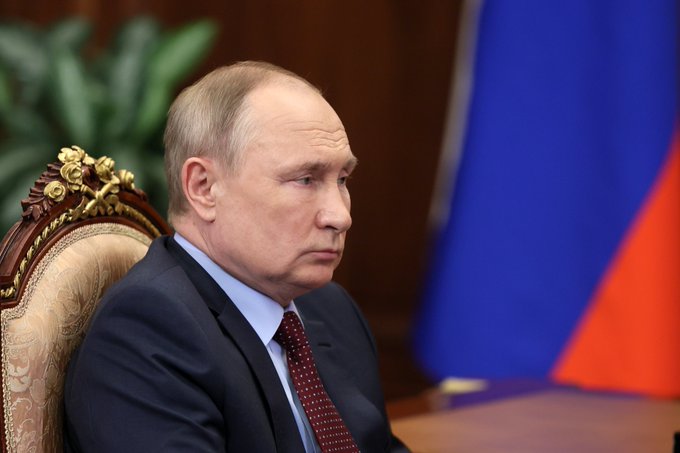Russian President Vladimir Putin expressed his “deepest condolences” to Azerbaijan on Saturday following the tragic crash of an Azerbaijani Airlines plane, which killed 38 passengers. However, he stopped short of accepting responsibility for the disaster, which has sparked international outrage and renewed questions about Russia’s air defense systems.
The Embraer 190 aircraft, which was en route from Baku to Grozny, crashed in Kazakhstan earlier this week after making multiple failed attempts to land in Grozny. The incident has caused widespread speculation, with many Western analysts and officials pointing the finger at Russia’s air defense systems.
Putin’s phone call to Azerbaijani President Ilham Aliyev came three days after the crash, marking a significant shift in the Kremlin’s response. In a brief statement issued by the Kremlin, Putin acknowledged that Russian air defense systems were active in the region at the time of the crash but stopped short of admitting any direct involvement in downing the aircraft.
“I would like to express my sincere apologies for the tragedy that took place in Russian airspace,” Putin told Aliyev, according to the Kremlin transcript. “During this period, Grozny, Mozdok, and Vladikavkaz were under attack by Ukrainian combat drones, and our air defense systems were actively repelling these attacks.”
Azerbaijan Disputes Russian Version
In stark contrast, President Aliyev insisted that the plane had been hit by external interference while in Russian airspace. According to Baku, the aircraft’s fuselage showed multiple signs of physical damage consistent with an attack, and surviving passengers reported hearing what they described as an “explosion” before the crash. Aliyev’s office emphasized that these signs of “foreign physical and technical interference” were a key part of the investigation.
“It is clear that the plane encountered an external attack which caused it to lose control,” the Azerbaijani statement read. “This attack is consistent with the testimony of the surviving passengers and the physical evidence found on the aircraft.”
The Azerbaijani president also demanded that those responsible for the attack be held accountable, with the national airline, Azerbaijan Airlines, calling the incident “a deliberate act of aggression” against its passengers.
Meanwhile, survivors have shared harrowing details of the flight’s final moments. One flight attendant, who was injured in the crash, described hearing a loud explosion shortly before the plane began to spiral out of control. “The cabin filled with smoke, and we couldn’t breathe. It all happened so fast. We thought we were going to die.”
International Reactions and Accusations
As the investigation continues, international governments have weighed in on the situation. The U.S. government, which has maintained tense relations with Moscow since the beginning of the war in Ukraine, said it had received “early indications” that Russian air defense systems may have played a role in downing the plane.
White House spokesperson John Kirby stated on Friday: “We have early indications that point to the possibility that the plane was brought down by Russian air defense systems. However, a thorough investigation is necessary to confirm these details.”
Ukrainian President Volodymyr Zelensky also weighed in, expressing concern that the crash was a result of Russian military action. Speaking to reporters, Zelensky said the plane’s damage and witness testimonies suggested a missile strike. “The footage and evidence we’ve seen makes it look very much like an air defense missile strike. We need clarity, and Russia must explain what happened.”
In response to the mounting pressure, Russia has pledged to cooperate fully with an investigation by Kazakhstan and Azerbaijan. However, the Kremlin has rejected any claims of deliberate involvement, framing the incident as a tragic accident amid ongoing military actions in the region.
A Stark Reminder of MH17?
Many analysts have drawn comparisons between this crash and the 2014 downing of Malaysia Airlines Flight MH17 over eastern Ukraine, which was attributed to a Russian-made surface-to-air missile fired by Russian-backed separatists. The European Union, through its foreign affairs chief, Kaja Kallas, called the Azerbaijan crash a “stark reminder” of the MH17 tragedy.
“The world cannot afford another tragedy like this. An independent, international investigation must be launched to get to the truth,” Kallas stated, urging Moscow to cease its disinformation campaigns regarding the incident.
For many in Azerbaijan, the crash has left not only a painful loss but also a deep sense of betrayal. The country has long been an ally of Russia, but this incident has sparked a renewed wave of anti-Russian sentiment, with some calling for a break in diplomatic relations or at least a public apology from Moscow.
Airlines Cancel Flights to Russia
The growing controversy surrounding the crash has had a ripple effect across the aviation industry. Several airlines, including those from Russia’s allies, have announced suspensions of flights to Russia in the wake of the incident. Turkmenistan Airlines, the state carrier of the secretive Central Asian nation, became the latest to cancel flights to Moscow, halting service between Ashgabat and Moscow for the period between December 30 and January 31.
Flydubai, the UAE’s national carrier, also suspended flights to southern Russian cities like Mineralnye Vody and Sochi. Meanwhile, Kazakhstan’s Qazaq Air has announced it will not fly to Yekaterinburg until the end of January, citing security concerns.
The suspensions add to a growing list of cancellations, many of which were already in place after Russia’s 2022 invasion of Ukraine. Western carriers ceased flying to Russia shortly after the conflict began, and now even some former allies are taking a step back.

